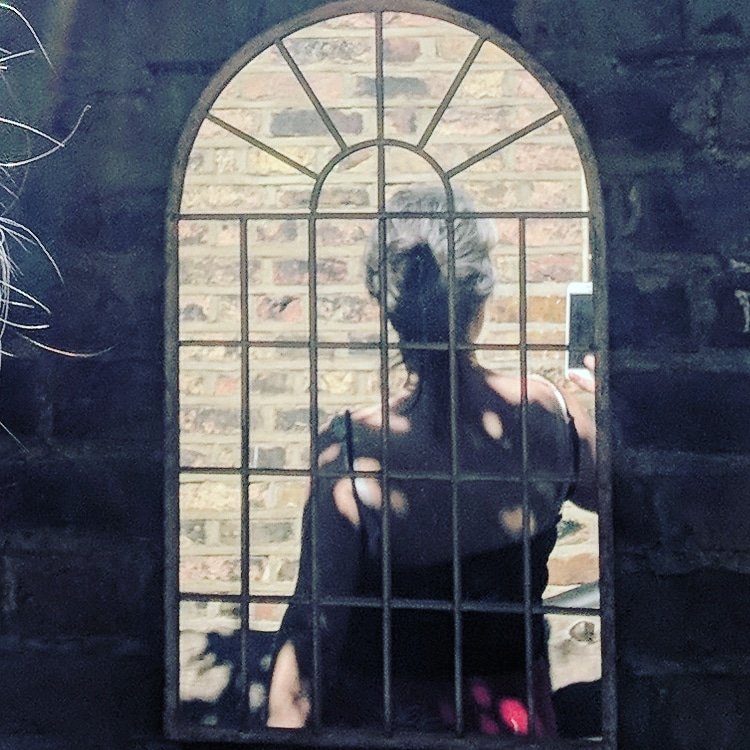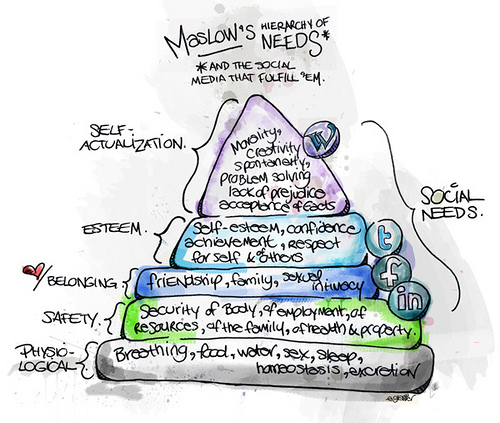At school pick-up one day, I walked over to a mum whose kid plays with mine. She was staring at her mobile phone not typing or speaking so it didn’t feel like I was interrupting anything when I said Hi. She looked up at me and immediately looked back down at her phone. I stood awkwardly wondering what to do next. Then another mum came over and said: Hi. Mobile phone mum looked up, immediately put her phone in her pocket, and began an animated conversation with the new mum.
Sociologist Sherry Turkle says that even a silent phone disconnects us, it indicates that any conversation can be interrupted at anytime as the phone has an equality with the now. In this way, Turkle believes that mobile technologies erode our empathy for other people.
I find this an old-fashioned view. Turkle and others are basically saying that technology is a thing outside of us, an unstoppable force over which we have no control and which carries us away to places we don’t want to go.
I beg to differ. Like Marshall McLuhan, I believe that technology is an extension of us and how we behave. And, more importantly, we can choose how to use it and we just must take responsibility for our actions. Mobile phone mum is a perfect example. She knew exactly what she was doing when she wordlessly wielded her phone at me and then put it away for the next mum.
The smartphone in and of itself is an amazing invention. It is a mini-computer which is all people could talk about wanting back in 2007 during some usability research I did for Orange. It thrills me everyday, I kid you not, to hold so powerful a device in my hand (see Augmenting Humans and Travels without my phone).
I think this is because I was fifteen years old when my parents first got a phone in our house and I’d barely gotten used to the excitement of it ringing when I went off to university to not have a phone number to give to people. I would go to the phone box if I wanted to phone someone. As a student in France I could only make a phone call if I had money and if I had remembered to go to the tabac to buy a phone card. I wonder how different life would have been, and indeed how different life is for students today, with a mobile phone and instant access to anyone.
Back then, I wandered around the world unreachable. Unless you knew my address and wrote me a letter, or you came to visit, you couldn’t contact me. Sometimes I was lonely. I spent all my time in shared spaces indoors and out, private and public (like parks and cafes, flats and universities) alone and with people, friends and strangers. In fact one time I was sat in the park in Chambéry and a friend I hadn’t seen in weeks who had moved to the Dordogne, wandered across and said: Thank God, you’re here. I was running out of places to look and was worried you’d gone away. I’ve nowhere else to stay tonight.
Feeling at home in shared spaces can be difficult and so designing public spaces to make them seem more friendly and safe and accessible remains a fascinating area of research. In Jane Jacobs’s classic book The Death and Life of Great American Cities, and Bill Hillier’s Space Syntax, the question often is: How do we make the public more sociable?
Many people think that the mobile phone is an invasion of the public by the private. Dom Joly’s I’m on the phone sketch is as funny today as it was when mobile phones were new. Similarly, last summer in the Louvre, I couldn’t get near the Mona Lisa because it had a billion people in front of it taking selfies.
Today, as I write this I think, well why not? Why not have a Mona Lisa selfie? Why not talk really loudly on your phone in public? Why not take up space and behave like you belong?
It can be hard to feel like somewhere public is familiar and friendly, but with easy connection to the Internet anywhere and anytime, people can use their phones to engage with their location by reading restaurant reviews, historical information, the locations of other people nearby, and of course by taking a selfie. There is much research into how we can redefine public spaces with mobile technology so everyone can feel familiar in a new or intimidating place but already the phone helps.
In my time as a student, wandering about Europe, I didn’t have such a luxury and as such was always at the mercy of strangers and exhausted by trying to figure out how things worked. Strange men would come and talk to me and give me their addresses if I sat in the park or on trains or when I wandered down the street. I have fond memories of the French farmer who used to jump out when I cycled past on my way to or from Bourget du Lac. He wanted me to come to his farm and meet his son: Venez, venez, madamoiselle. My mother always warned me about strange men, she was worried I would end up behind someone’s wallpaper. (Funnily enough strange women never approached me with their pockets full of written addresses. Would I have responded differently if they had?)
My first day in France, I cried on the bus. I didn’t have the right ticket because the bus worked differently to what I had expected. The driver let me on free and the next day when I was on another bus going the other way he stopped his bus when he saw me, beeped his horn and waved at me. It never occurred to me he was waving at me so half a dozen people on the bus tapped me on the shoulder to let me know it was me. Mortified, I waved back and cried again and a couple of old ladies comforted me whilst saying Oooh-la-la as I remembered how I had gotten off at the wrong stop, gotten lost, and gave up, at which point I let some random bloke take me to my home in his car. With a phone, I would have known how the ticket system worked, where to go exactly, which stop and so on, and I would have cried a lot less. Without a phone, I saw just how kind people can be to a lost and lonely girl.
In the book Mobile interfaces in Public Spaces, the authors consider the social and spatial changes in our society which have come about with mobiles phones by comparing it to the book, the Walkman and the iPod. These are all things we have used in the past to feel more at home say on a train, in a cafe, or in the park. They allows us to be present and yet go elsewhere as I have pondered in the blog Where do we go when we go online?That said, when I used to read the English paper in the park in Chambéry, it was always a day old, a male Jehovah’s Witness would regularly appear. He wanted to check the football scores in the Premier League.
There is the worry that phones are disconnecting us from the world and people around us because these interactions will no longer happen if we are too busy staring into our screens and everyone has access to the same information. But the authors above argue that mobile devices work as interfaces to public spaces and strengthen our connections to locations.
But what about our connection to people? Well! There are times when you just don’t want to be sociable or you require a different sociability, that of strangers, say who are enduring a long commute and need to carve out a space of their own whilst in a public space.
In July, I went to a talk given by Alastair Horne aka @pressfuturist at the British Library on ambient literature, in particular Keitai shousetsu, the first mobile phone fictions or Japanese cell phone novels in the noughties. They were written by young women, in the same way that they were read, on a small screen using text language, in serial form, during a commute. It was an intimate form of storytelling which led readers to give suggestions as to how the story should continue. The phone was often an integral part of the story because the writer and reader were both writing and reading in similar circumstances, exploring the story as it unfolded, and their commute became an exciting shared experience.
Interactive fiction and text adventures are not new, but their transfer to a mobile phone was and the immediacy it offers. Ten years later with better connectivity, ambient fiction is the next step. Stories are heard in a particular place and location and the phone again becomes part of the story, the shared experience and the connection.
Shared experiences and connection give our lives meaning. But, sometimes the reality of a moment or a person in a public space – like mobile mum – can really let us down, which is why I love the power of the mobile phone in my hand. It can interrupt my reality and get me through a difficult moment and onto the next. Not all strangers are kind, but from experience, especially the ones which I have shared here with you today, I can definitely tell you, the unkind phone wielding ones are absolutely in the minority – an amazing thought which will make me cry with gratitude every time. My mother always told me that I would never get through life if I cried like that all that time. I am pleased to report I have gotten through life exactly like that, yes, crying all the time. And can say, I have been shown many kindnesses and I am immensely grateful.






2 comments